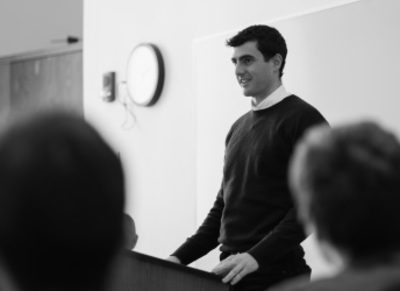-
898Bounded ModalityPhilosophical Review 128 (1): 1-61. 2019.What does 'might' mean? One hypothesis is that 'It might be raining' is essentially an avowal of ignorance like 'For all I know, it's raining'. But it turns out these two constructions embed in different ways, in particular as parts of larger constructions like Wittgenstein's 'It might be raining and it's not' and Moore's 'It's raining and I don't know it', respectively. A variety of approaches have been developed to account for those differences. All approaches agree that both Moore sentences a…Read more
-
636Triviality Results and the Relationship between Logical and Natural LanguagesMind 128 (510): 485-526. 2019.Inquiry into the meaning of logical terms in natural language (‘and’, ‘or’, ‘not’, ‘if’) has generally proceeded along two dimensions. On the one hand, semantic theories aim to predict native speaker intuitions about the natural language sentences involving those logical terms. On the other hand, logical theories explore the formal properties of the translations of those terms into formal languages. Sometimes, these two lines of inquiry appear to be in tension: for instance, our best logical inv…Read more
-
440I Believe I Can φIn Thomas Brochhagen, Floris Roelofsen & Nadine Theiler (eds.), Proceedings of the 20th Amsterdam Colloquium, . pp. 256-265. 2015.We propose a new analysis of ability modals. After briefly criticizing extant approaches, we turn our attention to the venerable but vexed conditional analysis of ability ascriptions. We give an account that builds on the conditional analysis, but avoids its weaknesses by incorporating a layer of quantification over a contextually supplied set of actions.
-
778Agentive ModalsPhilosophical Review 126 (3): 301-343. 2017.This essay proposes a new theory of agentive modals: ability modals and their duals, compulsion modals. After criticizing existing approaches—the existential quantificational analysis, the universal quantificational analysis, and the conditional analysis—it presents a new account that builds on both the existential and conditional analyses. On this account, the act conditional analysis, a sentence like ‘John can swim across the river’ says that there is some practically available action that is …Read more
-
230Parsing and Presupposition in the Calculation of Local ContextsSemantics and Pragmatics. forthcoming.In this paper, we use antecedent-final conditionals to formulate two problems for parsing-based theories of presupposition projection and triviality of the kind given in Schlenker 2009. We show that, when it comes to antecedent-final conditionals, parsing-based theories predict filtering of presuppositions where there is in fact projection, and triviality judgments for sentences which are in fact felicitous. More concretely, these theories predict that presuppositions triggered in the antecedent…Read more
-
492A Note on the Architecture of PresuppositionSemantics and Pragmatics 9 (13). 2016.The Proviso Problem is the discrepancy between the predictions of nearly every major theory of semantic presupposition about what is semantically presupposed by conditionals, disjunctions, and conjunctions, versus observations about what speakers of certain sentences are felt to be presupposing. I argue that the Proviso Problem is a more serious problem than has been widely recognized. After briefly describing the problem and two standard responses to it, I give a number of examples which, I arg…Read more
-
268Dissatisfaction TheorySemantics and Linguistic Theory 26 391-416. forthcoming.I propose a new theory of semantic presupposition, which I call dissatisfaction theory. I first briefly review a cluster of problems − known collectively as the proviso problem − for most extant theories of presupposition, arguing that the main pragmatic response to them faces a serious challenge. I avoid these problems by adopting two changes in perspective on presupposition. First, I propose a theory of projection according to which presuppositions project unless they are locally entailed. Sec…Read more
New York, New York, United States of America
Areas of Specialization
| Philosophy of Language |
| Formal Semantics |
| Pragmatics |

